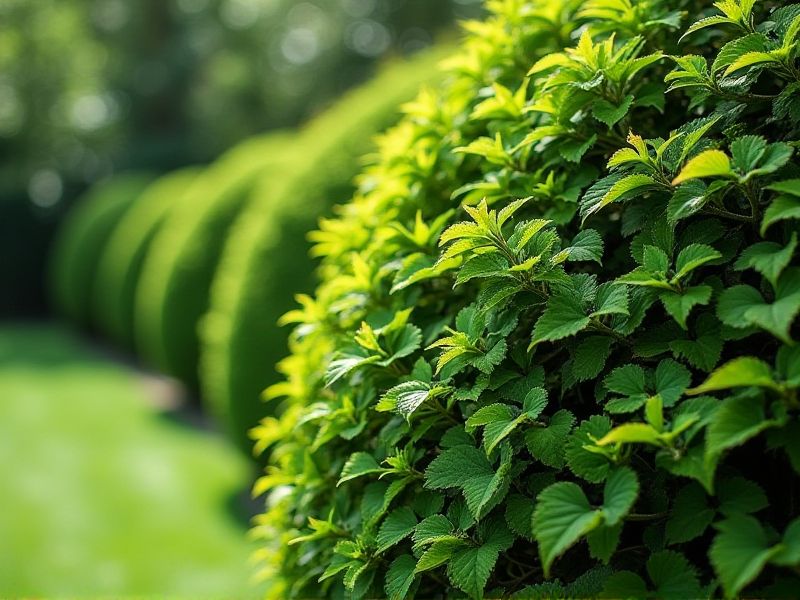
Consider selecting hedge plants like boxwood (Buxus), Yew (Taxus), or Privet (Ligustrum), which require minimal maintenance and infrequent trimming. Valorize the natural growth patterns of these species; they generally maintain a dense form without extensive intervention. Low-growing Junipers (Juniperus) and native species like Wax Myrtle (Myrica cerifera) also provide excellent options, thriving in various conditions while promoting local biodiversity. Opt for evergreen varieties if year-round privacy or windbreaks are desired, as they retain foliage throughout the seasons. Evaluate your local climate to ensure the best performance and resilience of these low-maintenance hedge plants.
List of some Hedge plants that need minimal trimming
- Boxwood (Buxus sempervirens)
- Yew (Taxus baccata)
- Japanese Holly (Ilex crenata)
- Inkberry (Ilex glabra)
- Privet (Ligustrum vulgare)
- Viburnum (Viburnum tinus)
- Portuguese Laurel (Prunus lusitanica)
- Spotted Laurel (Aucuba japonica)
- Dwarf Cherry Laurel (Prunus laurocerasus 'Otto Luyken')
- Hornbeam (Carpinus betulus)
Important things about Hedge plants that need minimal trimming
Low-Maintenance Varieties
Consider selecting low-maintenance hedge plants such as boxwood, which thrives in various soil types and requires minimal trimming to maintain its shape. Another excellent option is the Japanese holly, known for its dense foliage and resilience to pests, making it a perfect choice for a lush, green barrier with little upkeep. Additionally, the dwarf Alberta spruce offers a naturally compact growth habit, eliminating frequent pruning while providing year-round color and structure. Your garden can benefit from these easy-care hedges that enhance privacy and curb appeal without the need for extensive maintenance.
Slow Growth Rate
Hedge plants known for their slow growth rate, such as Boxwood and Japanese Holly, require minimal trimming, making them ideal for low-maintenance landscaping. These plants typically grow at a rate of less than 12 inches per year, which means they retain their shape longer without extensive pruning. Incorporating slow-growing hedges into your garden not only adds structure but also conserves resources like time and labor. Selecting hardy varieties ensures resilience, offering year-round foliage without the hassle of frequent maintenance.
Drought Tolerance
Hedge plants like Juniper, Boxwood, and Yew are excellent choices for drought-tolerant landscaping, requiring minimal trimming while maintaining their aesthetic appeal. These species are adapted to thrive in arid conditions, using less water and demonstrating resilience during dry spells. Your choice of well-established hedges can significantly reduce maintenance tasks, as these plants grow densely and naturally form a strong barrier. Selecting native varieties enhances drought resistance even further, promoting sustainability in your garden while conserving water resources.
Disease Resistance
When selecting hedge plants that require minimal trimming and exhibit robust disease resistance, consider varieties such as the **Euonymus** and **Holly** species. The **Boxwood** is also a popular choice, known for its adaptability and resilience against pests and diseases like boxwood blight. Planting **Privet** can further enhance your landscape, as it thrives well in various climates and demonstrates good resistance to common threats like aphids. By implementing these disease-resistant hedge plants, you can create a low-maintenance, lush border in your garden without the continual need for pruning.
Natural Shape Retention
Hedge plants such as Boxwood and Yew are renowned for their natural shape retention and require minimal trimming. These evergreen varieties maintain their form throughout the seasons, offering aesthetic appeal without the need for frequent maintenance. Their dense foliage not only provides effective privacy screening but also supports wildlife habitat, attracting beneficial pollinators. Choosing these low-maintenance hedge plants allows you to enjoy the beauty of a manicured landscape while saving time and effort in upkeep.
Seasonal Interest
Hedge plants such as Boxwood, Privet, and Yew are ideal for gardeners seeking low-maintenance landscaping options that require minimal trimming. These species exhibit dense foliage and natural growth habits that maintain their shape over time, reducing the need for frequent pruning. Additionally, many of these plants are evergreen, providing year-round privacy and greenery, which enhances your outdoor space's aesthetics. By selecting these hardy shrubs, you can enjoy a beautifully manicured garden with less effort and maintenance.
Pest Resistance
Hedge plants that exhibit pest resistance often require minimal trimming, making them ideal for low-maintenance gardening. Varieties such as Thuja Green Giant and Boxwood are known for their resilience against common pests like aphids and spider mites, which reduces the need for chemical interventions. These hardy plants not only maintain their shape well over time but also contribute to garden aesthetics with their lush green foliage. By selecting pest-resistant hedge plants, you can enjoy a vibrant landscape while minimizing labor and resource use in maintenance.
Suitable For Various Climates
Hedge plants such as the boxwood (Buxus sempervirens), privet (Ligustrum), and leyland cypress (Cupressocyparis leylandii) thrive in a variety of climates and require minimal trimming to maintain their shape and health. The boxwood is particularly favored for its evergreen foliage and adaptability to diverse soil conditions, making it ideal for shaping formal hedges. Privet offers dense growth and is effective for creating privacy screens, while leyland cypress excels in fast growth and height, providing an excellent windbreak. Selecting the right hedge plants can enhance your landscape's aesthetics while minimizing maintenance efforts significantly.
Noise Reduction Properties
Hedge plants, such as Privet or Boxwood, are excellent for creating natural barriers that effectively reduce noise pollution in residential areas. Their dense foliage acts as a sound buffer, absorbing and deflecting unwanted noise from traffic or neighbors. These varieties usually require minimal trimming, making them a low-maintenance option for homeowners looking to enhance privacy while enjoying a quieter environment. Choosing the right hedge can significantly improve your outdoor space's tranquility, providing both aesthetic and functional benefits.
Erosion Control Benefits
Hedge plants, such as Boxwood and Privet, serve as effective erosion control solutions while requiring minimal trimming. These hardy shrubs develop dense root systems that stabilize soil and prevent erosion, making them ideal for sloped landscapes. Additionally, they provide a natural barrier against wind and rain, further protecting the soil from degradation. By incorporating low-maintenance hedges into your garden, you can enhance soil stability and enjoy the benefits of reduced upkeep.
